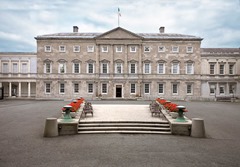Oireachtas round-up
 In its last month before the summer recess, the Oireachtas debated the future of the Seanad and emotive legislation on abortion, both of which tested the loyalties of backbenchers. Dáil Éireann also paid tribute to its long-serving Clerk and reflected public outcry over the Anglo tapes revelations.
In its last month before the summer recess, the Oireachtas debated the future of the Seanad and emotive legislation on abortion, both of which tested the loyalties of backbenchers. Dáil Éireann also paid tribute to its long-serving Clerk and reflected public outcry over the Anglo tapes revelations.
As the Anglo tapes continued to shock public opinion, they also prompted political questions about the Government’s response as Dáil proceedings got under way in July.
Sinn Féin’s Pearse Doherty asked Michael Noonan if he regretted continuing to employ John Bowe and Peter Fitzgerald in a State-owned bank. Noonan was “deeply disturbed” by the conversations. “Irish taxpayers,” he continued, “have grimly endured the austere cost of the bank re-capitalisation and the bank guarantee and are, understandably, outraged by these revelations.”
He pledged to tighten up and enforce regulation but added: “It would not be appropriate for me to discuss the employment of specific individuals in the bank.” Noonan confirmed that none of the new executive or non-executive directors were involved with the bank prior to nationalisation.
Deputy Shane Ross accepted most of the Minister’s response but added: “It is well-known that all conversations of this sort were recorded.” In the light of that, he could not understand why “nobody in the department and particularly in the Central Bank … did not ask, immediately the crisis broke or immediately there was a question about solvency or liquidity for these tapes, to see what had been going on inside the bank if it had any doubt.”
Noonan said that he was unaware of internal recordings of conversations between banking executives but concluded: “The banks should be on alert, if they were not already before today, since Deputy Ross has raised the matter, that these electronic data may be required by the Oireachtas inquiry when it is put in place.”
On a lighter note, independent deputy Tommy Broughan’s Brighter Evenings Bill 2012 was brought forward for its second reading on 5 July. The Bill called for the Government to consider advancing the clocks by one hour, thus bringing the State into the central European time zone.
“Like many other citizens, I have always found the turning back of the clocks in late October to be a depressing experience,” he remarked. “It adds another gloomy layer to the onset of winter.”
“The oddity of political life is that the issue of time and the change of time every six months is the responsibility of the Minister for Justice and Equality,” Alan Shatter said in response. “One is entitled to regard it both as a serious issue and to be a little amused by it.”
Shatter suggested that having a different zone from the UK would have major consequences as it is the State’s largest trading partner and the two countries share a land border. The debate was adjourned with the Bill remaining on the order paper, as Shatter pledged to bring it to the attention of the Justice, Defence and Equality Committee.
On 11 July, Alan Shatter took the Thirty-third Amendment of the Constitution (Court of Appeal) Bill 2013 through its second stage. Fianna Fáil Justice Spokesman Niall Collins supported the Bill as the new court would reduce a four-year backlog at the Supreme Court. However, his party was “concerned about the unseemly public disputes” between the Minister and the judiciary. The proposal will be put to the people, alongside the proposal to abolish Seanad Éireann, in the referenda on 4 October.
Shatter was back in the House five days later to respond to Mick Wallace’s Garda Síochána (Amendment) Bill 2013, which aimed to establish an independent oversight board.
The Minister questioned the need for a board when the Garda was already accountable to himself, the Public Accounts Committee and its inspectorate. An Garda Síochána was also the State’s intelligence service and border control authority, functions traditionally controlled by central government. The Bill was rejected by 100 votes to 26 at its second reading vote on 17 July.
As expected, the Protection of Life During Pregnancy Bill proved to be one of the most contentious bills to come before the Oireachtas. It was enacted by President Higgins on 30 July after several days of heated debate.
Fine Gael’s 2011 manifesto had pledged to establish an all-party committee to consider the implications of the ABC ruling. Separately, during the general election campaign, the party had stated that it was “opposed to the legalisation of abortion.” Labour’s manifesto commitment was to “legislate in accordance with” the X and ABC cases.
The Bill makes clear that it is an offence to “intentionally destroy unborn human life” except in three circumstances i.e. a real and substantial risk of the loss of the woman’s life from a physical illness, in an emergency, or by way of suicide.
Opponents question the Bill’s ethical grounds and medical evidence, and claim that it conflicts with Article 40 of the Constitution.
The most prominent rebel, Lucinda Creighton, remains a member of Fine Gael and also a Vice-President of the European People’s Party. She holds that post until 2015 and her strong constituency base and international connections mean that she is likely to continue to be a significant political figure.
A long era in the history of the Oireachtas ended on 17 July as members paid tribute to the retiring Secretary General and Clerk of Dáil Éireann, Kieran Coughlan, who has held the post since 1990. As Enda Kenny recalled, the Cork man arrived in Leinster House in 1973 and oversaw the modernisation of the chamber, including the introduction of television coverage.
“Through all that time, the outstanding characteristic of this Clerk of the Dáil was his absolute integrity in all his dealings with matters of public life and of the Houses of the Oireachtas,” Kenny added. Members also added their best wishes to his wife, Denise, and his daughters, Becky and Ruth.
The Taoiseach nominated Hildegarde Naughton, a primary school teacher, to fill the vacancy in the caused by the resignation of Senator Martin McAleese. Naughten has been a Fine Gael member of Galway City Council since 2009 and was the city’s Mayor in 2011-2012.
That said, the Government is continuing to press ahead with its plans to abolish the upper chamber. Supporters of the Seanad claim that a second chamber improves how government is held to account.
An unexpected and perhaps unprecedented row broke out 19 July when Labour’s John Kelly was nominated to replace James Heffernan on the European Affairs Committee. Heffernan had left the Labour Party after voting against last year’s Social Welfare Bill.
“I was not aware of the circumstances as to how the vacancy arose. On that basis, I am not prepared to take up that position,” Kelly protested. “I ask the [Seanad] leader to have me formally removed from the committee. I fundamentally disagree with the bully-boy tactics of removing Oireachtas members from committees.”
Cathaoirleach Paddy Burke said that this was outside his powers. Senator Kelly, he said, could “take up his issue” with Labour group leader Ivana Bacik and resign from the committee. Several other senators defended Kelly and objected to the strict whip system.
In a dramatic turn, Senator Diarmuid Wilson withdrew his Fianna Fáil party colleagues from the House “because of the outrageous lack of democracy that has been shown here this morning.”
The Seanad divided 22 in favour of the motion and 11 against. Neither Senator Kelly nor Senator Heffernan voted but Kelly was duly appointed to the committee. In the following week, the Seanad approved the legislation for the abolition referendum (35-25) although most Fine Gael senators and all Labour and Fianna Fáil senators reportedly plan to campaign for its retention.
Dáil Éireann and Seanad Éireann are both adjourned until 2.30pm on Wednesday, 18 September.
The departure of TDs and senators as a result of the abortion legislation has almost doubled the number of independents in Dáil Éireann. Fourteen independent TDs were elected in the 2011 general election.
Another four TDs left their parties for various reasons between March 2011 and July 2013: Tommy Broughan, Patrick Nulty and Róisín Shortall (Labour), and Denis Naughten (Fine Gael).
Seven TDs became independent in July: Lucinda Creighton, Terence Flanagan, Peter Mathews, Billy Timmins and Brian Walsh (Fine Gael), Colm Keaveney (Labour), and Peadar Tóibín (Sinn Féin). Tóibín has been suspended from his party for six months.
This brings the number of independent TDs to 25. The Seanad meanwhile has 13 independent senators. Five were elected by Trinity and the National University of Ireland. Another five were appointed by the Taoiseach. Three more have left their parties: Paul Bradford, Fidelma Healy Eames (FG) and James Heffernan (Labour).
Willie Penrose resigned Labour parliamentary party whip in November 2011 but remains a member of the party – and is considered a Labour TD by his former colleagues. The ‘ex-Fine Gael’ TDs technically remain party members but none of them are considered Fine Gael TDs by the parliamentary party.







